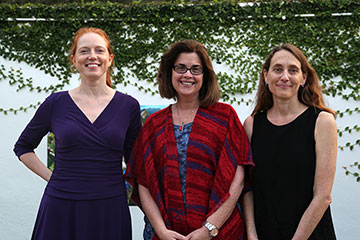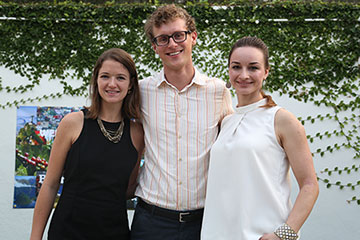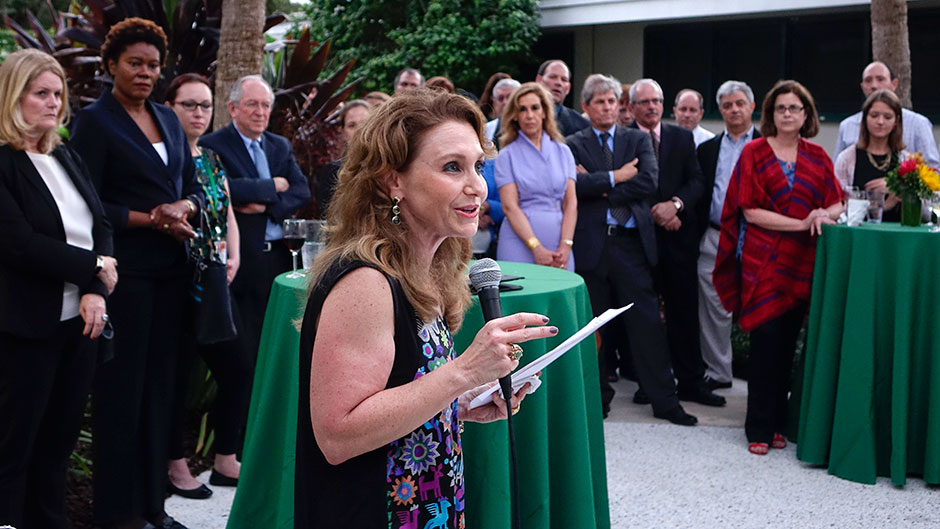The University of Miami Institute for Advanced Study of the Americas (UMIA), previously known as the University of Miami Institute for the Americas, officially opened its doors at its new Albert Pick Hall location to become part of the University hemispheric strategy and make full use of the hemispheric endowment that it represents.
Led by Dr. Felicia Marie Knaul, UMIA promotes enhanced human, economic and social development within and across the hemisphere through research, teaching, convening, communicating, and incubating innovative projects. “Our mission is to build a thriving Institute that creates and shares knowledge bridging the Americas, strengthening the myriad areas of the University of Miami undertaking research pertaining to the hemisphere,” Knaul said.
UMIA, which held an Open House on December 2 to celebrate its new name, partners, mission, and location in the former home of the Graduate School, builds from the leadership, trajectory, and interests of the Center for Hemispheric Policy and the Center for Latin American Studies. “Very few think tanks attached to universities have a global health agenda,” Knaul said. “This is one of the themes that the institute will be addressing, including the work on Women’s Cancers in the Americas in a joint effort with the Sylvester Comprehensive Cancer Center and the UHealth System; investing in health systems through diagonal approaches; and advocating for the role of women through gender transformative policies.”
“We have probably one of the top Caribbean programs in the United States and one of best programs for the study of Brazil,” said Leonidas Bachas, dean of the College of Arts & Sciences. “Things are happening and will continue to happen at the institute.”
 |
| Faculty leads Merike Blofield, Sallie Hughes, and Kate Ramsey |
To support the institute’s research endeavors, Knaul has invited Sallie Hughes, associate professor at the School of Communication and an expert in Latin America, to join UMIA as faculty research lead for Latin American studies and policy. Hughes has been working closely with UMIA since August.
“Geography is destiny; but it also takes leadership, ambition, and hard work, and I am more optimistic than ever that we are going to reach that destiny,” Hughes said.
In addition, Merike Blofied and Kate Ramsey, faculty leads for Women’s and Gender Studies and Hemispheric Caribbean Studies, respectively, will be joining UMIA next spring. “We are also working with Ileana Porras and we will be working and generating another research lead on Social Justice in the Americas, something that we feel in these times is particularly important,” Knaul said.
Likewise, three graduate students, Caitlin Brown, Matthew Davidson, and Yulia Vorobyeva, are the recipients of the UMIA/Latin American Studies Program Distinguished Fellows grants awarded by the College of Arts & Sciences to fund student work in all areas of Latin America and the Caribbean. The goals of these grants are to offer students an opportunity to acquire a comprehensive knowledge of language, terrain, and culture; become familiar with information and sources relevant to their studies; conduct pilot work and preliminary investigations; and develop contacts with scholars and institutions in their fields of study.
 |
| Distinguished fellows Caitlin Brown, Matthew Davidson, and Yulia Vorobyeva |
In his brief remarks at the Open House, UM President Julio Frenk noted that no other university in the United States, or for that matter in the world, has the advantage of being located in one of the most cosmopolitan cities and to serve really as a force of integration across the Americas.
“So, having an institute that is devoted to the advanced study of the Americas and a convening function, as well as the scholarship around the whole array of disciplines that contribute to an understanding of the Americas is certainly a matter of great pride for the University,” he said. “It is a great occasion to see that the building is finally ready, and that it will continue the great tradition of Latin American studies, convening of hemispheric policies, and we look forward to great new developments in this University of Miami Institute for the Advanced Study of the Americas.”
The Open House was a beautiful example of interdisciplinary collaboration, displaying art work and musical performances from the region and bringing together students from various schools, faculty members, and other organizations.
Percussionist Murphy Aucamp and his band, all students at the Frost School of Music, performed live salsa in Pick Hall’s courtyard. Art works from Latin America and the Caribbean included paintings, handcrafts, and photographs from Cuba, Curacao, Haiti, Guatemala, Mexico, Peru, and Trinidad and Tobago.
And photographer Behna Gardner, wife of Laurence B. Gardner, interim dean of the Miller School of Medicine, broke many hearts with her touching exhibit from Zanmi Beni (creole for “Blessed Friends”), an orphanage outside Port-au-Prince that is home to 64 children many of whom were left homeless and abandoned after the devastating earthquake of Haiti in 2010. The photos are collection of portraits taken on the day the children were baptized. To learn more about Zamni Beni, visit http://www.friendsofzb.org.
One of Knaul’s major ongoing projects is the work of the Lancet Commission on Global Access to Palliative Care and Pain Control, whose final report is expected to be launched next summer at the University of Miami. Looking forward, the institute will build on recently begun initiatives, including the Research Lunch Series, a Latin America and Caribbean Digest edited every two weeks by the distinguished fellows, a new series on Leading Ladies of the Americas, annual country-specific symposia, featured research from grant recipients, and publications, among others.
“We will continue building a robust agenda for the region, helping the institute become a catalyst for those working across campus, and giving all a home,” Knaul said in her closing remarks.

